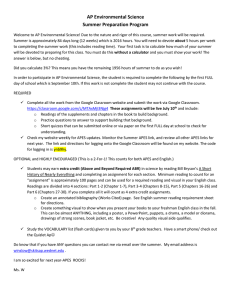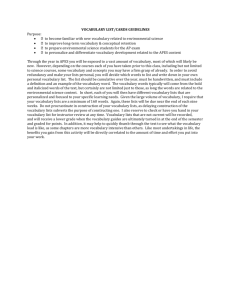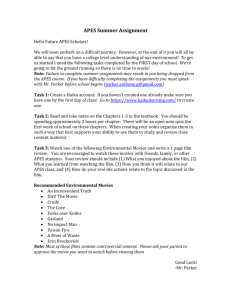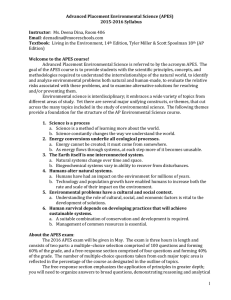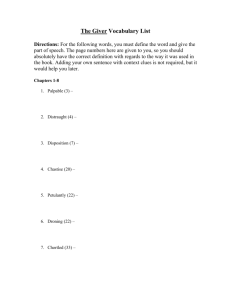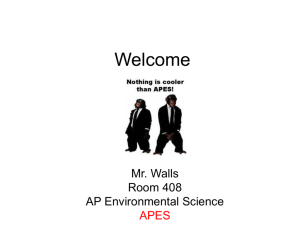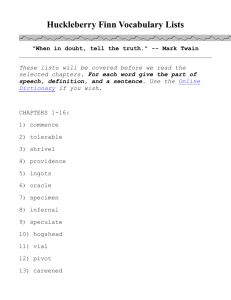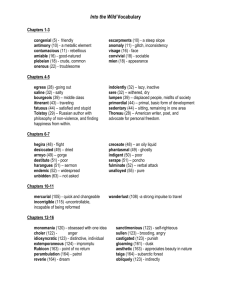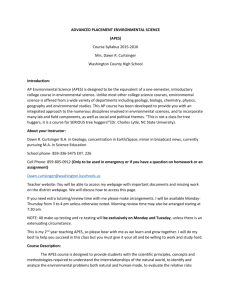APES Course Description APES Welcom Letter
advertisement
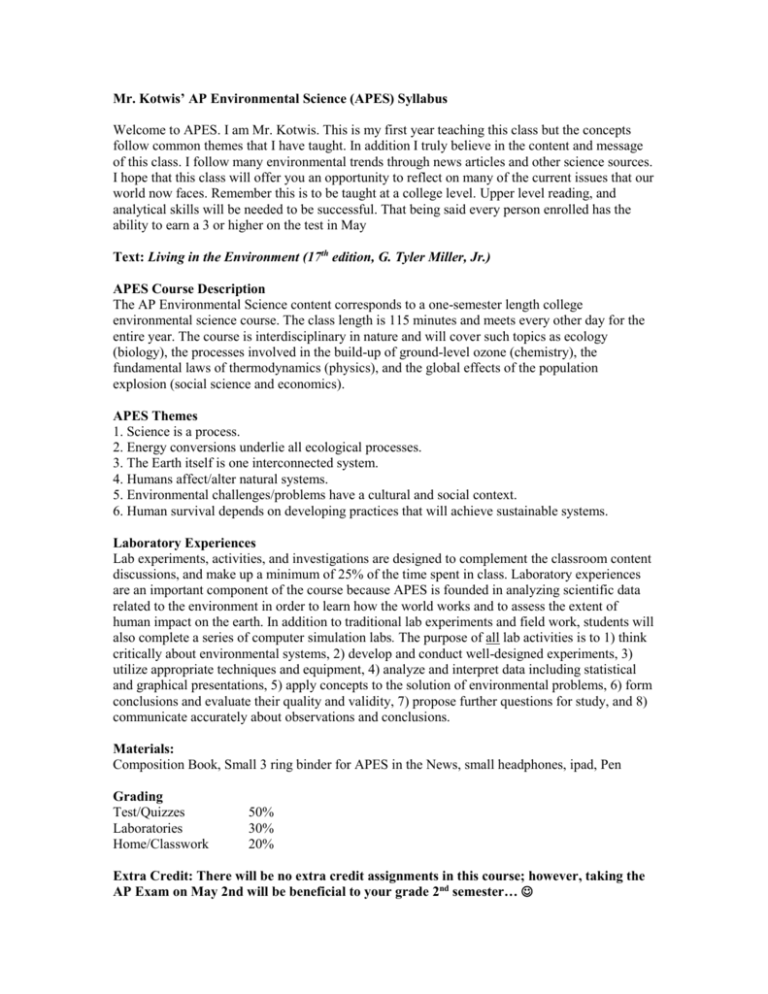
Mr. Kotwis’ AP Environmental Science (APES) Syllabus Welcome to APES. I am Mr. Kotwis. This is my first year teaching this class but the concepts follow common themes that I have taught. In addition I truly believe in the content and message of this class. I follow many environmental trends through news articles and other science sources. I hope that this class will offer you an opportunity to reflect on many of the current issues that our world now faces. Remember this is to be taught at a college level. Upper level reading, and analytical skills will be needed to be successful. That being said every person enrolled has the ability to earn a 3 or higher on the test in May Text: Living in the Environment (17th edition, G. Tyler Miller, Jr.) APES Course Description The AP Environmental Science content corresponds to a one-semester length college environmental science course. The class length is 115 minutes and meets every other day for the entire year. The course is interdisciplinary in nature and will cover such topics as ecology (biology), the processes involved in the build-up of ground-level ozone (chemistry), the fundamental laws of thermodynamics (physics), and the global effects of the population explosion (social science and economics). APES Themes 1. Science is a process. 2. Energy conversions underlie all ecological processes. 3. The Earth itself is one interconnected system. 4. Humans affect/alter natural systems. 5. Environmental challenges/problems have a cultural and social context. 6. Human survival depends on developing practices that will achieve sustainable systems. Laboratory Experiences Lab experiments, activities, and investigations are designed to complement the classroom content discussions, and make up a minimum of 25% of the time spent in class. Laboratory experiences are an important component of the course because APES is founded in analyzing scientific data related to the environment in order to learn how the world works and to assess the extent of human impact on the earth. In addition to traditional lab experiments and field work, students will also complete a series of computer simulation labs. The purpose of all lab activities is to 1) think critically about environmental systems, 2) develop and conduct well-designed experiments, 3) utilize appropriate techniques and equipment, 4) analyze and interpret data including statistical and graphical presentations, 5) apply concepts to the solution of environmental problems, 6) form conclusions and evaluate their quality and validity, 7) propose further questions for study, and 8) communicate accurately about observations and conclusions. Materials: Composition Book, Small 3 ring binder for APES in the News, small headphones, ipad, Pen Grading Test/Quizzes Laboratories Home/Classwork 50% 30% 20% Extra Credit: There will be no extra credit assignments in this course; however, taking the AP Exam on May 2nd will be beneficial to your grade 2nd semester… APES Sequence Semester 1 Unit 1. An Introduction to Ecological Thinking: Chapters 1, 2, 3 Unit 2. The Physical World: Chapters 3, 4.2, 4.6, 6.1, 6.2 & 16.1-16.4 Unit 3. The Living World I: Chapters 4 - 8 Unit 4. Population Ecology: Chapters 9-10 Unit 5. Land and Water Use: Chapters 14, 15, 16 & 23 Unit 6. Energy: Chapters 17-18 Semester 2 Unit 7. Pollution: Chapters 19, 20, 22 & 24 Unit 8. Global Issues: Chapters 11-13 & 21 Unit 9. Social, Political & Economic Issues: Chapters 26 & 27 Class Expectations 1. All Shorewood rules and expectations as outlined in the student handbook will be adhered to in class. 2. Read and study every night. Although there will certainly be content that I cover in lecture, much of our class time together will be spent on class discussions, activities, labs and field studies. Depending on how quickly you read and assimilate information, you should plan on spending 45-60 minutes per night on APES. We will be covering about one chapter per week in the class, so even if I don’t formally assign homework on a given night, the expectation is that you are keeping up. 3. Take notes. By taking notes on text readings, class lectures and discussions, videos and other resources, you will be creating what should be a very valuable study guide to prepare for all exams and quizzes, including the AP Exam in May. 4. Be an active class participant. Be present mentally as well as physically. 5. Homework assignments (e.g., lab reports, chapter reviews, etc.) are due at the beginning of class. Assignments are considered late if they are turned in after the start of class on the due date. Grades will be reduced based on the lateness of the assignment. 6. Copying of work will result in a zero grade for all papers involved. 7. Be present on exam days. You will know these dates well in advance and should be in class. If you miss an exam and it is an excused absence, please be prepared to make it up before school on the day you return. 8. State Law states that there should be no eating or drinking in any part of the science classroom.
